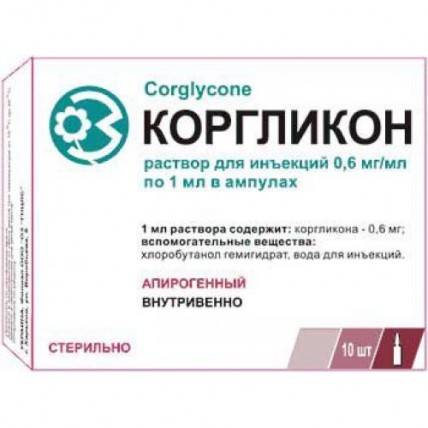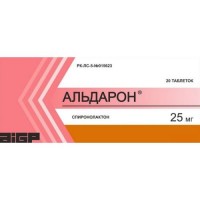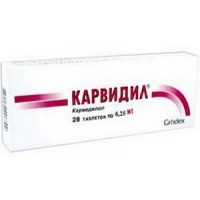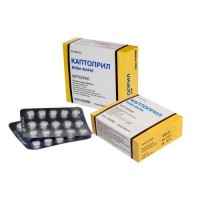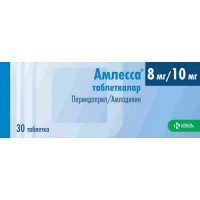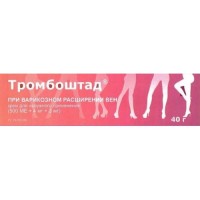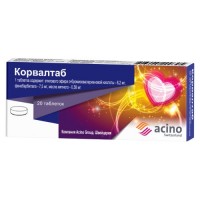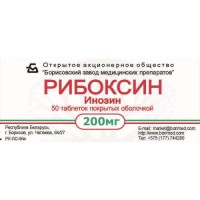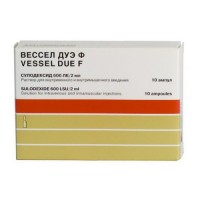Korglikon 0.06% / 10s ml solution for injection in ampoules
- $3.10
Sku:
e6eb3bb9c424
Brand:
OZ GNCLS (Ukraine)
The instruction for medical use
of KORGLYKONUM medicine
the Trade name
Korglykonum
the International unlicensed name
Is not present
the Dosage form
Solution for injections 0.6mg/ml
Structure
1 ml of solution contains
active agent – Korglykonum of 0.6 mg,
excipients: chlorobutanol gemigidrat, water for injections.
The description
Transparent liquid of slightly yellowish color, with a specific slight smell
Pharmacotherapeutic group
Drugs for treatment of heart diseases. Other cardiac glycosides.
The ATX C01AX code
the Pharmacological
Pharmacokinetics In properties of blood Korglykonum poorly contacts proteins of plasma. Is exposed to biotransformation in a liver. At distribution in an organism gets into fatty tissue slightly. Elimination half-life makes 28-36 hour. It is brought out of an organism mainly with urine and bile, at disturbance of a zhelchevyvedeniye the drug excretion share kidneys increases. Usually drug does not kumulirut in an organism, however cumulation is possible at patients with disturbances of secretory function of kidneys and diskinetichesky disorders of a biliary system. The pharmacological effect develops in 3-5 min. after intravenous administration of drug, the maximum of action is noted in 25-30 min.
The pharmacodynamics
Korglykonum is a mix of glycosides of a lily of the valley. The main pharmakodinamichesky effects of Korglykonum are positive inotropic, negative dromotropic and chronotropic effects. Cardiac glycosides strengthen systolic reductions of heart, extend a diastole, slow down a heart rhythm, reduce excitability of the carrying-out system of heart. Strengthening of reduction of a myocardium considerably improves blood circulation. The mechanism of effect of Korglykonum on heart is connected with stimulation of a sodium potassium pump and increase in level of catecholamines in a myocardium that causes positive inotropic effect. Besides, under the influence of Korglykonum the activity of phosphodiesterase decreases that leads to increase in cyclic adenosinemonophosphate.
Indications
- acute and chronic heart failure
- a takhisistolichesky form of atrial fibrillation
- a supraventricular Bouveret's disease
the Route of administration and doses
enter Korglykonum intravenously. Introduction 0.9% of NaCl solution carry out slowly within 5-6 minutes to 10-20 ml of 20% or 40% of solution of glucose and also 1-2 times a day. The adult enter in a single dose 0.5-1 ml, to children aged from 2 up to 5 years – on 0.2-0.5 ml, from 6 to 12 years – on 0.5-0.75 ml. At introduction 2 times a day the interval between injections is equal to 8-10 hours.
The highest doses for adults: single – 1.0 ml, daily – 2.0 ml.
Side effects
- disturbance of conductivity and a heart rhythm (bradycardia, ventricular arrhythmias, lengthening of atrioventricular carrying out with development of blockade of different degree)
- a headache, dizziness, confusion of consciousness
- fatigue, weakness, insomnia, concern
- pain and paresthesias in extremities
- apathy
- nausea, vomiting, anorexia, discomfort and pains in epigastriums, diarrhea
- loss of fields of vision, disturbance of color perception, decrease in visual acuity
- strengthening of lung ventilation
- a hypopotassemia
- allergic reactions
Seldom
-
the Contraindication gynecomastia
- hypersensitivity to drug components
- endocarditises, acute myocarditis, the expressed cardiosclerosis
- Adams-Stokes-Morganya's syndrome
- glikozidny intoxication
- ventricular tachycardia
- AV blockade of II and III degrees
- the profound bradycardia
- a hypercalcemia
- a hypopotassemia
- the isolated mitral stenosis
- a hypertrophic subaortic stenosis
- a carotid sinus syndrome
- aneurysms of chest department of an aorta
- a WPW-syndrome
- an acute period of a myocardial infarction
- children's age up to 2 years
Medicinal interactions
At simultaneous use of Korglykonum with:
- adrenomimetika and xanthines, the likelihood of developing arrhythmia since raises. these drugs increase sensitivity of a myocardium to glycosides and increase danger of intoxication them
- Amiodaronum, propafenony, quinidine, Methyldopums, verapamil, Spironolactonum, erythromycin, tetracycline, omeprazolum and loperamide, increase concentration of Korglykonum in blood plasma with strengthening of its side effects
- m cholinomimetics, antikholinesterazny means, cytostatics, dipheninum, Metoclopramidum, reduce concentration of Korglykonum in blood plasma
- b-adrenoblockers and verapamil, strengthen decrease in atrioventricular conductivity
- APF inhibitors, increase sensitivity and reaction of heart to effect of Korglykonum
- diuretics, catecholamines, calcium drugs (especially at intravenous administration), increase risk of developing glikozidny intoxication
- non-steroidal anti-inflammatory drugs, can aggravate heart failure, reduce glomerular filtration and increase plasma concentration of cardiac glycosides
- glucocorticosteroids, diuretics, risk of development of a hypopotassemia, hypomagnesiemia
- drugs of calcium and a tiazidama increases, increase a hypercalcemia likelihood of development
- Unithiolum, fenotiazinovy neuroleptics, reduces cardiotonic effect of Korglykonum
- potassium drugs, reduce severity of glikozidny intoxication,
- antiarrhytmic drugs I of a class, expressiveness of aritmogenny effect of Korglykonum
- mercazolil, increases risk of developing a hyperthyroidism
- insulin, increase in its hypoglycemic effect is possible.
Special instructions
At disturbance of secretory function of kidneys it is necessary to reduce a drug dose for prevention of developing of glikozidny intoxication.
The likelihood of developing glikozidny intoxication raises also at electrolytic disturbances (a hypopotassemia, a hypomagnesiemia, a hypercalcemia), the expressed dilatation of cardial cavities, a pulmonary heart, an alkalosis, at elderly people.
The extra care and the ECG control is required at disturbance of AV of conductivity of the I degree, at a hypothyroidism. Regular control of efficiency and safety of therapy by drug is necessary.
The care is required in a thyrotoxicosis and atrial premature ventricular contraction.
Pregnancy and the period of a lactation
Korglykonum Use vozhmozhno only when the expected advantage for mother exceeds potential risk for a fruit and the child. At use of drug in the period of a lactation, control of the heart rate (HR) at the child is necessary.
The feature of influence of medicine on ability to run the vehicle or potentially dangerous mechanisms
during therapy should not be engaged in the dangerous types of activity demanding speed of motor and mental reactions (including driving of the car).
Overdose
Symptoms - arrhythmias, including bradycardia, AV-blockade, ventricular tachycardias or premature ventricular contraction, fibrillation of ventricles, anorexia, nausea, vomiting, diarrhea, a headache, fatigue, dizziness, it is rare - coloring of surrounding objects in green and yellow colors, decrease in visual acuity, scotoma, macro - and a micropsia, it is very rare – confusion of consciousness, syncopal states.
Treatment - when developing arrhythmia intravenously 2-2.4 g of potassium of chloride from 10 PIECES of insulin by drop infusion enter into 500 ml of 5% of solution of glucose (introduction is stopped at potassium concentration in blood serum 5 meq/l). Means which contain potassium are contraindicated at disturbance of atrioventricular conductivity. In the profound bradycardia appoint Atropini sulfas solution. Oxygenotherapy is shown. Vozhmozhno prescribing of Phenytoinum on 100 mg every 3-5 min. (before achievement of a total dose of 1000 mg) or intravenously by drop infusion in a dose of 10-15 mg/kg within 1 and more hours, further for the supporting treatment Phenytoinum is appointed orally on 400-600 mg of 1 times a day. Lidocaine is less effective, than Phenytoinum in glikozidny intoxication, Ca2 blockers + channels are contraindicated. As disintoxication means appoint also Unithiolum according to the scheme: in the first 2 days enter subcutaneously at the rate of 0.05 g of drug (1 ml of 5% of solution) for 10 kg of body weight of the patient 3 - 4 times a day, then 1 - 2 time a day before elimination of cardiotoxic action. In a lowering of arterial pressure – transfusion therapy.
A form of release and packing
Solution for injections of 0.06%. On 1 ml in ampoules, on 10 ampoules in a pack together with the instruction for use.
To Store storage conditions in the place protected from light, at a temperature from 15 ºС up to 25 ºС.
To store out of children's reach!
3 years
not to apply a period of storage after the expiration date specified on packing.
Prescription status
According to the prescription
LLC GNCLS Experimental Plant Producer.
Ukraine, Kharkiv, Vorobyov St., 8.
To develop
of KORGLYKONUM medicine
the Trade name
Korglykonum
the International unlicensed name
Is not present
the Dosage form
Solution for injections 0.6mg/ml
Structure
1 ml of solution contains
active agent – Korglykonum of 0.6 mg,
excipients: chlorobutanol gemigidrat, water for injections.
The description
Transparent liquid of slightly yellowish color, with a specific slight smell
Pharmacotherapeutic group
Drugs for treatment of heart diseases. Other cardiac glycosides.
The ATX C01AX code
the Pharmacological
Pharmacokinetics In properties of blood Korglykonum poorly contacts proteins of plasma. Is exposed to biotransformation in a liver. At distribution in an organism gets into fatty tissue slightly. Elimination half-life makes 28-36 hour. It is brought out of an organism mainly with urine and bile, at disturbance of a zhelchevyvedeniye the drug excretion share kidneys increases. Usually drug does not kumulirut in an organism, however cumulation is possible at patients with disturbances of secretory function of kidneys and diskinetichesky disorders of a biliary system. The pharmacological effect develops in 3-5 min. after intravenous administration of drug, the maximum of action is noted in 25-30 min.
The pharmacodynamics
Korglykonum is a mix of glycosides of a lily of the valley. The main pharmakodinamichesky effects of Korglykonum are positive inotropic, negative dromotropic and chronotropic effects. Cardiac glycosides strengthen systolic reductions of heart, extend a diastole, slow down a heart rhythm, reduce excitability of the carrying-out system of heart. Strengthening of reduction of a myocardium considerably improves blood circulation. The mechanism of effect of Korglykonum on heart is connected with stimulation of a sodium potassium pump and increase in level of catecholamines in a myocardium that causes positive inotropic effect. Besides, under the influence of Korglykonum the activity of phosphodiesterase decreases that leads to increase in cyclic adenosinemonophosphate.
Indications
- acute and chronic heart failure
- a takhisistolichesky form of atrial fibrillation
- a supraventricular Bouveret's disease
the Route of administration and doses
enter Korglykonum intravenously. Introduction 0.9% of NaCl solution carry out slowly within 5-6 minutes to 10-20 ml of 20% or 40% of solution of glucose and also 1-2 times a day. The adult enter in a single dose 0.5-1 ml, to children aged from 2 up to 5 years – on 0.2-0.5 ml, from 6 to 12 years – on 0.5-0.75 ml. At introduction 2 times a day the interval between injections is equal to 8-10 hours.
The highest doses for adults: single – 1.0 ml, daily – 2.0 ml.
Side effects
- disturbance of conductivity and a heart rhythm (bradycardia, ventricular arrhythmias, lengthening of atrioventricular carrying out with development of blockade of different degree)
- a headache, dizziness, confusion of consciousness
- fatigue, weakness, insomnia, concern
- pain and paresthesias in extremities
- apathy
- nausea, vomiting, anorexia, discomfort and pains in epigastriums, diarrhea
- loss of fields of vision, disturbance of color perception, decrease in visual acuity
- strengthening of lung ventilation
- a hypopotassemia
- allergic reactions
Seldom
-
the Contraindication gynecomastia
- hypersensitivity to drug components
- endocarditises, acute myocarditis, the expressed cardiosclerosis
- Adams-Stokes-Morganya's syndrome
- glikozidny intoxication
- ventricular tachycardia
- AV blockade of II and III degrees
- the profound bradycardia
- a hypercalcemia
- a hypopotassemia
- the isolated mitral stenosis
- a hypertrophic subaortic stenosis
- a carotid sinus syndrome
- aneurysms of chest department of an aorta
- a WPW-syndrome
- an acute period of a myocardial infarction
- children's age up to 2 years
Medicinal interactions
At simultaneous use of Korglykonum with:
- adrenomimetika and xanthines, the likelihood of developing arrhythmia since raises. these drugs increase sensitivity of a myocardium to glycosides and increase danger of intoxication them
- Amiodaronum, propafenony, quinidine, Methyldopums, verapamil, Spironolactonum, erythromycin, tetracycline, omeprazolum and loperamide, increase concentration of Korglykonum in blood plasma with strengthening of its side effects
- m cholinomimetics, antikholinesterazny means, cytostatics, dipheninum, Metoclopramidum, reduce concentration of Korglykonum in blood plasma
- b-adrenoblockers and verapamil, strengthen decrease in atrioventricular conductivity
- APF inhibitors, increase sensitivity and reaction of heart to effect of Korglykonum
- diuretics, catecholamines, calcium drugs (especially at intravenous administration), increase risk of developing glikozidny intoxication
- non-steroidal anti-inflammatory drugs, can aggravate heart failure, reduce glomerular filtration and increase plasma concentration of cardiac glycosides
- glucocorticosteroids, diuretics, risk of development of a hypopotassemia, hypomagnesiemia
- drugs of calcium and a tiazidama increases, increase a hypercalcemia likelihood of development
- Unithiolum, fenotiazinovy neuroleptics, reduces cardiotonic effect of Korglykonum
- potassium drugs, reduce severity of glikozidny intoxication,
- antiarrhytmic drugs I of a class, expressiveness of aritmogenny effect of Korglykonum
- mercazolil, increases risk of developing a hyperthyroidism
- insulin, increase in its hypoglycemic effect is possible.
Special instructions
At disturbance of secretory function of kidneys it is necessary to reduce a drug dose for prevention of developing of glikozidny intoxication.
The likelihood of developing glikozidny intoxication raises also at electrolytic disturbances (a hypopotassemia, a hypomagnesiemia, a hypercalcemia), the expressed dilatation of cardial cavities, a pulmonary heart, an alkalosis, at elderly people.
The extra care and the ECG control is required at disturbance of AV of conductivity of the I degree, at a hypothyroidism. Regular control of efficiency and safety of therapy by drug is necessary.
The care is required in a thyrotoxicosis and atrial premature ventricular contraction.
Pregnancy and the period of a lactation
Korglykonum Use vozhmozhno only when the expected advantage for mother exceeds potential risk for a fruit and the child. At use of drug in the period of a lactation, control of the heart rate (HR) at the child is necessary.
The feature of influence of medicine on ability to run the vehicle or potentially dangerous mechanisms
during therapy should not be engaged in the dangerous types of activity demanding speed of motor and mental reactions (including driving of the car).
Overdose
Symptoms - arrhythmias, including bradycardia, AV-blockade, ventricular tachycardias or premature ventricular contraction, fibrillation of ventricles, anorexia, nausea, vomiting, diarrhea, a headache, fatigue, dizziness, it is rare - coloring of surrounding objects in green and yellow colors, decrease in visual acuity, scotoma, macro - and a micropsia, it is very rare – confusion of consciousness, syncopal states.
Treatment - when developing arrhythmia intravenously 2-2.4 g of potassium of chloride from 10 PIECES of insulin by drop infusion enter into 500 ml of 5% of solution of glucose (introduction is stopped at potassium concentration in blood serum 5 meq/l). Means which contain potassium are contraindicated at disturbance of atrioventricular conductivity. In the profound bradycardia appoint Atropini sulfas solution. Oxygenotherapy is shown. Vozhmozhno prescribing of Phenytoinum on 100 mg every 3-5 min. (before achievement of a total dose of 1000 mg) or intravenously by drop infusion in a dose of 10-15 mg/kg within 1 and more hours, further for the supporting treatment Phenytoinum is appointed orally on 400-600 mg of 1 times a day. Lidocaine is less effective, than Phenytoinum in glikozidny intoxication, Ca2 blockers + channels are contraindicated. As disintoxication means appoint also Unithiolum according to the scheme: in the first 2 days enter subcutaneously at the rate of 0.05 g of drug (1 ml of 5% of solution) for 10 kg of body weight of the patient 3 - 4 times a day, then 1 - 2 time a day before elimination of cardiotoxic action. In a lowering of arterial pressure – transfusion therapy.
A form of release and packing
Solution for injections of 0.06%. On 1 ml in ampoules, on 10 ampoules in a pack together with the instruction for use.
To Store storage conditions in the place protected from light, at a temperature from 15 ºС up to 25 ºС.
To store out of children's reach!
3 years
not to apply a period of storage after the expiration date specified on packing.
Prescription status
According to the prescription
LLC GNCLS Experimental Plant Producer.
Ukraine, Kharkiv, Vorobyov St., 8.
To develop
